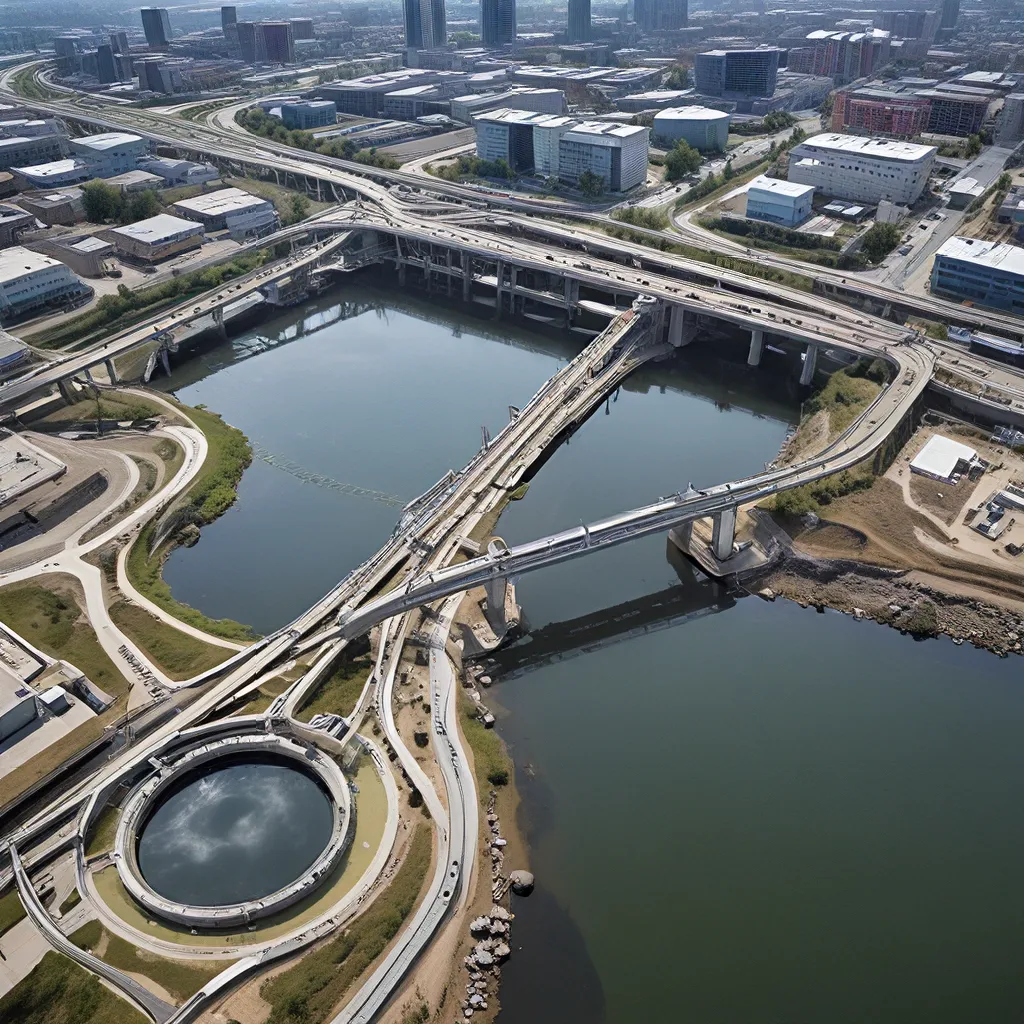
As an avid outdoorsman and environmental enthusiast, I’ve always been fascinated by the intricate web of systems that keep our cities running. And when it comes to the unsung heroes of urban infrastructure, wastewater management is undoubtedly one of the most crucial yet often overlooked components.
Think about it – every time you flush the toilet, take a shower, or run the dishwasher, you’re contributing to a vast network of pipes, pumps, and treatment facilities that work tirelessly to ensure our water supply remains clean and safe. It’s a process that has evolved dramatically over the centuries, from primitive open-pit disposal to the sophisticated, high-tech systems we have today.
But the real game-changer? The integration of smart city technologies into wastewater management. By leveraging the power of sensor networks, data analytics, and automation, cities are revolutionizing the way they handle this essential service, ushering in a new era of efficiency, sustainability, and cost savings.
Unlocking the Potential of Smart Wastewater Management
As our cities continue to grow and evolve, the demands on our wastewater infrastructure have become increasingly complex. Traditional methods simply can’t keep up, leading to issues like water scarcity, environmental pollution, and exorbitant maintenance costs.
But smart wastewater management systems are changing the game. By incorporating a network of strategically placed sensors, these systems can collect real-time data on everything from water quality and flow rates to equipment performance and maintenance needs. This wealth of information is then analyzed using advanced data analytics and machine learning algorithms, enabling cities to optimize their operations in ways that were once unimaginable.
For example, in Barcelona, a comprehensive smart water management system has resulted in significant water savings and improved resource efficiency. And in Singapore, the integration of smart technologies into wastewater treatment plants has led to enhanced operational efficiency and reduced energy consumption.
But the benefits of smart wastewater management extend far beyond just cost savings. By constantly monitoring and adjusting the system, cities can minimize environmental impact, protect public health, and ensure the sustainable use of water resources. It’s a win-win-win scenario that’s transforming the way we think about urban infrastructure.
The IoT Revolution in Wastewater Management
At the heart of smart wastewater management lies the Internet of Things (IoT). By connecting a vast network of sensors, valves, and other devices, IoT technology allows for seamless communication and coordination across the entire system.
Imagine a scenario where a sensor detects a sudden spike in water flow – it can instantly communicate with the control center, which can then automatically adjust the system to divert water and prevent a potential overflow. Or what about a predictive maintenance algorithm that can identify potential equipment failures before they happen, allowing for proactive repairs and minimizing costly downtime?
These are the types of real-world applications that are revolutionizing the way cities manage their wastewater. And the potential doesn’t stop there. Emerging technologies like nanotechnology and advanced sensor systems hold tremendous promise for further improving efficiency, reducing costs, and enhancing environmental protection.
But the integration of IoT and smart technologies in wastewater management isn’t just about the hardware – it’s also about the data that these systems collect and how it’s used. Artificial Intelligence (AI) and Machine Learning (ML) algorithms are being increasingly employed to analyze complex datasets, predict system behavior, and optimize operations for better resource utilization.
And with the rise of blockchain technology, cities can now ensure the integrity and security of the data collected from various sources, promoting transparency and trust among stakeholders. It’s a technological revolution that’s transforming the way we think about wastewater management, and it’s only just getting started.
Addressing the Challenges of Smart Wastewater Integration
Of course, with any groundbreaking technological advancement, there are bound to be challenges and obstacles to overcome. And smart wastewater management is no exception.
One of the biggest hurdles is the financial investment required to implement these systems. Upgrading aging infrastructure and integrating cutting-edge smart technologies can be a significant financial burden, especially for cities with limited resources. But as more and more municipalities recognize the long-term benefits and cost savings, the investment is becoming increasingly worthwhile.
Another challenge is the resistance to change and lack of awareness among stakeholders. Shifting from traditional wastewater management methods to a smart, interconnected system can be a daunting prospect, and it requires effective communication, education, and stakeholder engagement to foster acceptance and support.
And then there are the ethical and privacy concerns surrounding the collection and use of personal data in smart wastewater systems. Cities must be proactive in implementing robust data protection measures and ensuring that individual privacy is protected, all while maintaining the transparency and trust that are essential for successful implementation.
The Future of Smart Wastewater Management
Despite these challenges, the future of smart wastewater management is undoubtedly bright. As the world continues to grapple with pressing environmental and resource challenges, the integration of smart technologies into urban infrastructure is becoming increasingly vital.
And with the continued advancements in areas like IoT, AI, and blockchain, the potential for expansion and improvement is virtually limitless. Imagine a world where wastewater treatment plants are fully automated, optimizing energy usage and water consumption with pinpoint precision. Or a city where stormwater management systems can anticipate and mitigate flooding before it even occurs.
These may sound like the stuff of science fiction, but the reality is that the future is already here. And as more and more cities embrace the power of smart wastewater management, we’re likely to see a transformative shift in the way we think about urban sustainability and resource utilization.
So, the next time you flush the toilet or take a shower, remember the unsung heroes working tirelessly behind the scenes to keep our cities clean, healthy, and thriving. And who knows – with the help of smart technologies, the future of wastewater management might just be brighter than ever before.